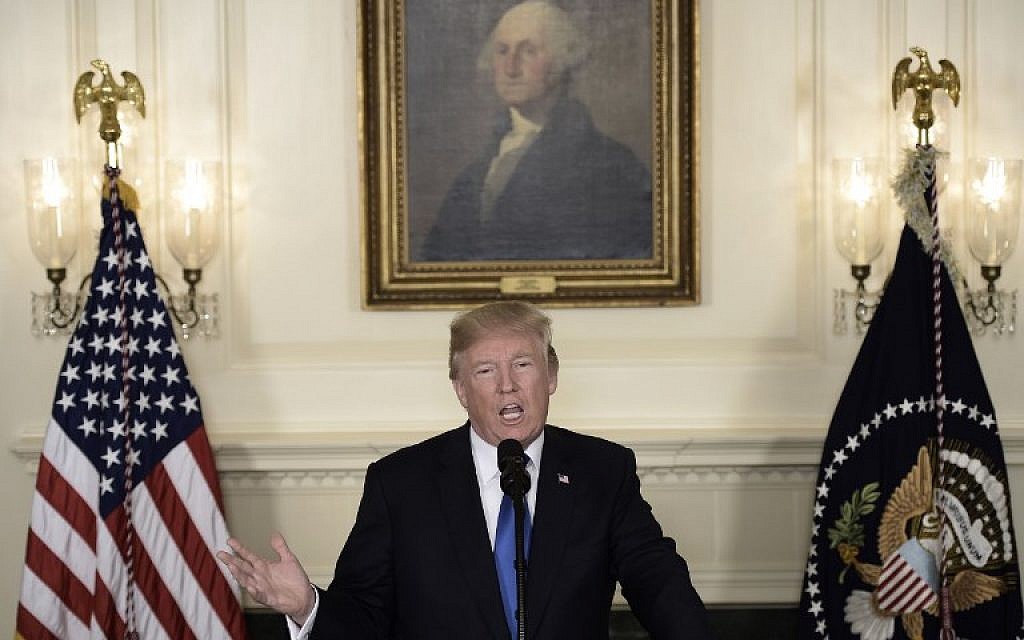London- Although it had been expected for months, US President Donald Trump’s unveiling of his new strategy on Iran seems to have taken the ruling elite in Tehran by surprise, intensifying the power struggle within it.
The radical faction close to “Supreme Guide” Ayatollah Ali Khamenei had expected Trump to tear-up the so-called nuclear deal, depriving the rival faction known as Rafsanjani’s orphans led by President Hassan Rouhani, of their main propaganda plank.
That Rouhani is anxious to pretend that the nuke deal remains intact is a sign of his faction’s failure to work out any alternative policy. If he denounces the deal, he would be validating Trump’s claim that Tehran never intended to abide by the rules. Such move would, in turn, persuade the Europeans and perhaps even Russia and China to tone down their support for Tehran against Washington.
“We intend to remain committed to the nuclear deal,” Rouhani said Friday night, “for as long as others continue to respect it.”
That was a strange position since one of those “others”, the US, had already announced it would not abide by the deal as it stands now.
“We hope that others will not follow Trump’s lead,” says Hessameddin Ashna, Rouhani’s chief political adviser. This means that Rafsanjani’s Orphans are determined to stick to the “deal” even when and if the US renders it meaningless.
For the deal to work in favor of Iran it is important that international banks and businesses resume treating the country as a normal partner.
Two years after the nuclear deal was announced, this hasn’t happened. The reason is that companies and banks are not sure that by doing business with Iran they would not risk running into trouble with US rules and regulations. Fear that the sanctions that were suspended under the nuclear deal could be snapped back at any time has prevented Iran from attracting any significant foreign investment.
For the same reason Iran has failed to regain access to world capital markets and banking services. Today, even Iranian embassies abroad are not allowed to open bank accounts and are forced to pay their staff in cash. Tehran is also forced to pay the militant groups it backs, notably Hezbollah in Lebanon, Islamic Jihad in Gaza and the Houthis in Yemen with suitcases filled with dollars.
However, Rouhani and his faction, which includes former President Muhammad Khatami, may not be totally unhappy with Trump’s move because the US president singled out the Revolutionary Guard Corps (IRGC), which is controlled by Khamenei, as the main culprit. The Rouhani faction is now harping on the theme that had it not been for the IRGC, the nuclear deal would have borne real fruits for Iran.
However, Trump, according to the daily Kayhan, believed to be a mouthpiece for Khamenei, chose a “more devious method” by not formally denouncing the deal while making it clear the US will intensify sanctions against Iran. This means that “Iran will continue to comply with the deal while the US refuses to abide by its pledges,” the paper says.
The IRGC is clearly happy that, despite months of rumors, Trump did not ask the US Congress to declare it a “terrorist organization”.
According to Kayhan, Trump “dared not” classify the IRGC as “terrorist.” The reason, Kayhan says, was “the stern warning” given by IRGC Commander General Muhammad-Ali Aziz Jaafari.
IRGC spokesman Gen. Massoud Jazayeri has also highlighted IRGC’s message of defiance.
“We intend to intensify our support for suffering peoples fighting for their rights everywhere, most notably in the Middle East,” he said.
The message was further amplified by Quds Corps Commander General Qassem Soleimani. He ended weeks of seclusion with a lightning trip to Iraq after which he posted his “selfies” all over the official media. The message was that he remains very much in business.
The IRGC also tried to dismiss Trump’s order for imposing economic sanctions on the IRGC’s business wing. That business wing, known as the Khatam al-Anbia Conglomerate, controls over 100 companies with a presence in Dubai, Oman, Austria, Cyprus, Greece and Turkey.
On Saturday, General Ibad-Allah Ibadi, the head of the conglomerate, inaugurated a new steel mill with a fiery speech about the IRGC’s determination to expand its business activities across the globe.
“Despite Trump’s forlorn attempts many around the world are keen to do business with us,” he claimed.
While Khamenei has maintained silence, at least at the time of this writing, spokesmen for the rival factions have tried to minimize the impact of Trump’s dramatic move in different ways.
Rouhani is beating the drums about a promise by French President Emmanuel macron to visit Tehran next year as a sign that Iran can ignore the US and “work with European and other partners.”
Rouhani’s rival in the recent presidential election, Ayatollah Ibrahim Raiisi, however, has called for a “full adoption of Resistance Economy” which means forgoing foreign trade and adopting a North Korean style system of self-sufficiency.
For the time being, the rival factions are jumping and gyrating much like angry cats meaning to spring at each other. Without knowing it, perhaps, under the surface, Trump may have sharpened the power struggle in Tehran.
